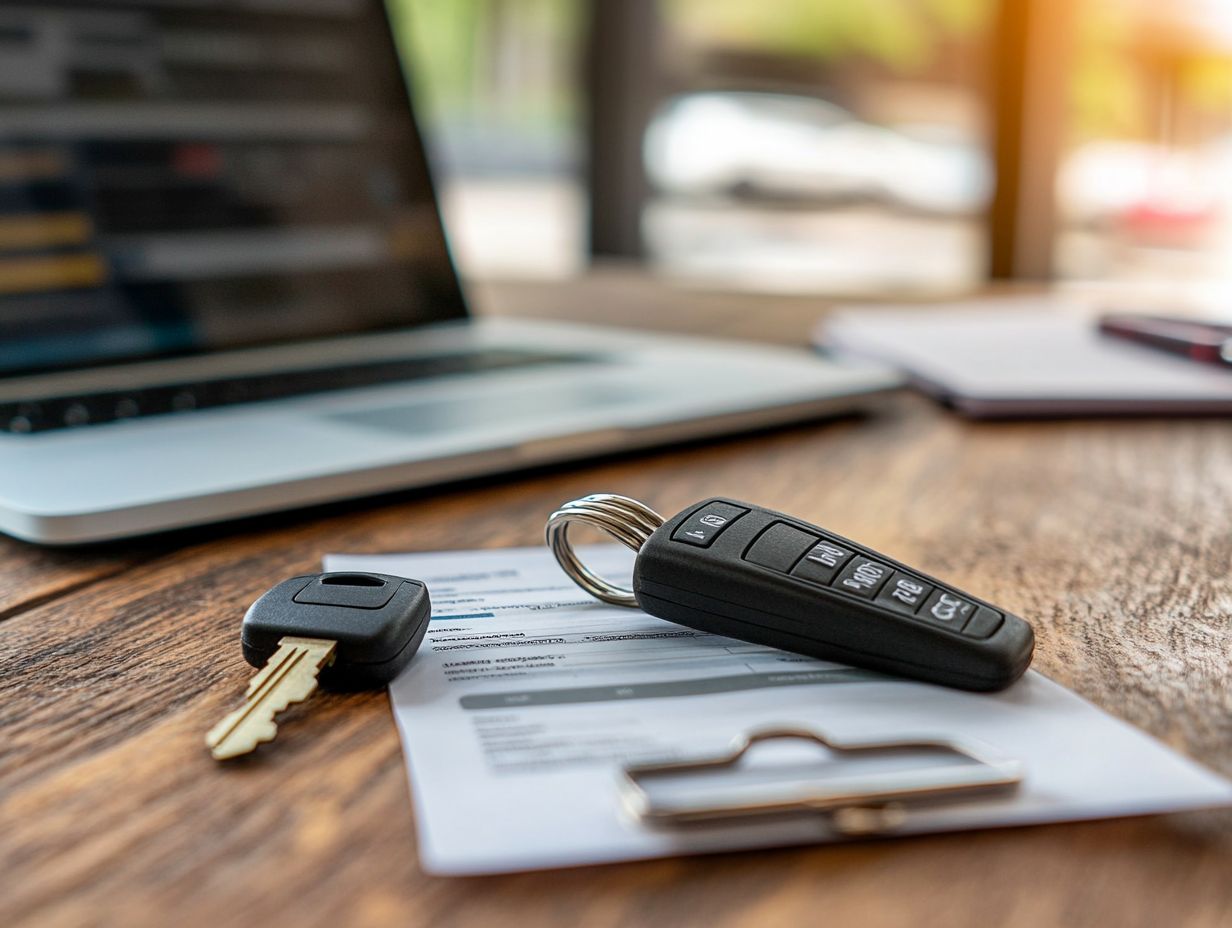The Importance of Vehicle History Reports
Are you buying or selling a vehicle? Understanding its history can make all the difference! Having a grasp on a vehicle’s history can truly transform the experience.
A Vehicle History Report (VHR) offers essential insights into a car’s past, empowering you to make informed decisions as a buyer and enabling you to effectively highlight your vehicle’s value as a seller. This article delves into what a VHR entails, why it s significant, the key details it contains, and the best ways to obtain one.
You ll learn how to interpret the findings and spot any red flags that might indicate potential issues. Explore how this invaluable tool can safeguard your investment and facilitate a smoother transaction.
Contents
- Key Takeaways:
- What is a Vehicle History Report?
- Why Vehicle History Reports are Important
- What Information is Included in a Vehicle History Report?
- How to Obtain a Vehicle History Report
- Interpreting a Vehicle History Report
- Red Flags to Look for in a Vehicle History Report
- Frequently Asked Questions
- What is a vehicle history report and why is it important?
- How can a vehicle history report benefit me as a buyer?
- What information is included in a vehicle history report?
- Where can I obtain a vehicle history report?
- Do vehicle history reports cover all types of vehicles?
- Are vehicle history reports 100% accurate?
Key Takeaways:

- Vehicle history reports provide a comprehensive record of a vehicle’s past, including its ownership, accident history, and maintenance records.
- These reports are crucial for both buyers and sellers, as they can help verify a vehicle’s condition and protect against fraud.
- It is important to carefully review and understand the information in a vehicle history report, as it can reveal potential red flags and prevent costly mistakes.
What is a Vehicle History Report?
A Vehicle History Report (VHR) serves as an essential document that unveils the comprehensive past of a used car, giving you the power to make informed decisions during your car-buying journey. This report typically encompasses details about the vehicle’s accident history, previous ownership, maintenance records, and even odometer readings all vital for evaluating the car’s overall condition and reliability.
By obtaining a VHR, you significantly enhance the transparency of the transaction, fostering trust between you and the seller.
Why Vehicle History Reports are Important
Vehicle History Reports are an invaluable resource in the market for used cars, offering both buyers and sellers crucial insights that can profoundly influence their decisions. For buyers, these reports unveil critical details about a used car s accident history and any odometer readings that may raise red flags, such as a situation where the odometer’s mileage is incorrectly reduced.
On the flip side, for sellers, providing a comprehensive vehicle history fosters credibility and paves the way for smoother transactions.
What Information is Included in a Vehicle History Report?
A comprehensive Vehicle History Report offers an invaluable snapshot of a used car’s past, encompassing a variety of important information. Key elements include accident history, maintenance records, open recalls, and a lien check, ensuring that there are no lingering financial claims against the vehicle.
Use trusted sources like CarFax and AutoCheck to access accurate and reliable information, giving you the confidence to make informed decisions.
How to Obtain a Vehicle History Report
Obtaining a Vehicle History Report is a crucial step in your journey to purchasing a used car. You have several options at your disposal.
You can opt for free vehicle reports that provide basic information, though these may not be as thorough as you d like. Alternatively, you can invest in comprehensive reports through reputable online platforms such as CarFax and AutoCheck.
While these services typically charge a fee, they deliver a wealth of detailed data that can significantly inform your decision. Be mindful that the cost will vary based on how in-depth the information you require is and which service provider you choose. Don’t wait! Get your Vehicle History Report today to secure the best deal.
Interpreting a Vehicle History Report

Interpreting a Vehicle History Report might initially appear overwhelming. However, grasping its terminology and data points is essential for making informed decisions regarding used cars.
Focus on key aspects such as the accident history, which reveals any prior incidents that could influence your choice, and the maintenance records, offering valuable insights into the vehicle’s upkeep. Look out for signs of flood damage or salvage titles, as these could indicate serious issues in the car’s history.
Red Flags to Look for in a Vehicle History Report
When you review a Vehicle History Report, it’s crucial to remain vigilant for red flags that could signal potential issues with the used car you re considering. Be on the lookout for warning signs like flood damage, salvage titles, and odometer rollback, as these can greatly affect the vehicle’s value and reliability. If you see multiple previous owners, it may indicate concerns about the car’s condition and history.
1. Understanding Accident History
Accident history within a Vehicle History Report offers crucial insights into any past incidents associated with the used car. This can significantly influence both its safety and value.
Any documented accidents can be a concern, potentially leading to increased insurance premiums due to perceived risks. A vehicle with a troubling accident history often sees a decline in resale value, as future buyers may think twice about acquiring a car with a questionable past. Understanding how these elements connect is essential for anyone considering a used vehicle. The safety of the car and its long-term financial implications heavily rely on its accident history.
2. Evaluating Maintenance Records
Maintenance records included in a Vehicle History Report are a crucial indicator of how well the used car has been cared for throughout its life. As you examine these records, you gain invaluable insights into the vehicle’s reliability and overall condition.
Proper maintenance documented through regular oil changes, brake inspections, and fluid replacements not only boosts performance but also extends the car’s lifespan. By sticking to recommended service schedules, you can prevent minor issues from snowballing into expensive repairs.
Ultimately, a well-maintained vehicle not only provides peace of mind for you as the current driver but also positions itself as a highly attractive option for future buyers, showcasing the true value embedded in its service history.
3. Checking for Open Recalls
Open recalls are a critical component of a Vehicle History Report, revealing whether the used car has unresolved safety issues that require attention. Overlooking these recalls can introduce significant safety risks for both you and your passengers, potentially leading to accidents or malfunctions.
Make sure to check the Vehicle History Report it could save you from a costly mistake! The good news is that these outstanding issues are usually rectifiable at authorized dealerships, where trained professionals can carry out the necessary repairs or updates at no cost to you.
Taking a proactive approach to addressing recalls not only ensures that your vehicle operates safely but also bolsters its long-term reliability and value, ultimately contributing to a more informed and secure driving experience.
4. Assessing Odometer Readings

Odometer readings in a Vehicle History Report are vital for you to determine the true mileage of a used car and spot any signs of odometer rollback. Accurate mileage plays a significant role in influencing a car’s overall value.
Typically, lower mileage indicates less wear and tear, making the vehicle more appealing to potential buyers. When you check the mileage, you not only uncover the actual distance driven but also gain valuable insights into the car s maintenance history and potential reliability.
Any discrepancies in odometer readings could signal past fraud or misuse, which can dramatically affect the resale price. Ensuring that the odometer reading aligns with the vehicle’s condition is crucial for both buyers and sellers. This alignment gives you the power to make informed and equitable transactions.
Conclusion: Carefully reviewing a vehicle history report is essential to ensure a safe, reliable, and valuable purchase. By understanding accident histories, evaluating maintenance records, checking for open recalls, and assessing odometer readings, you empower yourself to make the best decision when buying a used car.
5. Importance of a VIN Check
A VIN check is an essential element of a Vehicle History Report, as the Vehicle Identification Number serves as your unique identifier for the used car, linking it directly to its past.
This important process not only unveils critical information such as previous ownership, accidents, and title status. It also connects various data points like maintenance records and recalls. Thoroughly examining this information empowers you to make informed decisions, protecting against potential issues that may arise after your purchase.
A VIN check can reveal discrepancies between the vehicle’s reported condition and its actual history, helping you sidestep costly surprises. Ultimately, understanding the comprehensive background associated with a vehicle enhances transparency and builds trust in your purchasing journey.
6. Understanding Title Issues
Title issues can greatly influence the value of a used car, making it essential for you to examine the Vehicle History Report closely especially when it comes to salvage titles and lien checks.
These concerns not only affect your potential resale value but could also expose you to unexpected legal entanglements, particularly when state laws, like lemon laws, come into play. For example, understanding the details of a vehicle’s title can help you steer clear of buying a car with hidden damage or lingering financial obligations.
Understanding local regulations helps you navigate your rights effectively should you face any post-purchase complications. Staying informed about these critical matters ensures that you make a smart choice when investing in a used vehicle.
Frequently Asked Questions
-
What is a vehicle history report and why is it important?
A vehicle history report is a document that provides a detailed record of a specific vehicle’s past ownership, accidents, and other important information. It is important as it can help buyers make informed decisions when purchasing a used vehicle by providing them with valuable information about the vehicle’s history and potential red flags.
-
How can a vehicle history report benefit me as a buyer?
As a buyer, the importance of vehicle history reports can provide you with peace of mind and confidence in your purchase. It can help you avoid potential scams or hidden issues with the vehicle and give you a better understanding of the vehicle’s overall condition and value.
-
What information is included in a vehicle history report?
A vehicle history report typically includes details such as the vehicle’s ownership history, accident and damage reports, title and registration information, service and maintenance records, and any reported odometer readings. Some reports may also include information on open recalls and lemon law buybacks.
-
Where can I obtain a vehicle history report?
There are various companies and websites that offer vehicle history reports, such as Carfax, AutoCheck, and the National Motor Vehicle Title Information System. These reports can usually be purchased online by entering the vehicle’s VIN (vehicle identification number) or through a dealership.
-
Do vehicle history reports cover all types of vehicles?
Vehicle history reports are available for most cars and trucks but may not be available for motorcycles, RVs, or commercial vehicles. It is important to check with the specific company or website to see if they offer reports for the type of vehicle you are looking to purchase.
-
Are vehicle history reports 100% accurate?
While vehicle history reports strive to provide accurate and up-to-date information, they are not always 100% accurate. Some reports may miss out on certain information or may contain errors. It is always recommended to thoroughly inspect the vehicle and obtain a professional mechanic’s opinion before making a purchase.







